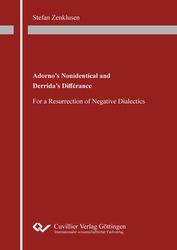| Departments | |
|---|---|
| Book Series (97) |
1381
|
| Nachhaltigkeit |
3
|
| Gesundheitswesen |
1
|
| Humanities |
2370
|
| Medienwissenschaften | 16 |
| Theology | 57 |
| Philosophy | 102 |
| Law | 423 |
| Economics | 852 |
| Social sciences | 417 |
| Sports science | 48 |
| Psychology | 233 |
| Educational science | 190 |
| History | 183 |
| Art | 111 |
| Cultural studies | 166 |
| Literary studies | 117 |
| Linguistics | 88 |
| Natural Sciences |
5407
|
| Engineering |
1798
|
| Common |
98
|
|
Leitlinien Unfallchirurgie
5. Auflage bestellen |
|
Advanced Search
Adorno’s Nonidentical and Derrida’s Différance (English shop)
For a Resurrection of Negative Dialectics
Stefan Zenklusen (Author)Preview
Extract, PDF (240 KB)
Table of Contents, PDF (190 KB)
The virulent anti-Hegelianism of French poststructuralism and its (difficult) confrontation with Jürgen Habermas has long obscured the closeness of Jacques Derrida’s “différance” to Theodor W. Adorno’s “Nonidentical.” Taking the overarching theme of “identity and difference” as a guide, we can peel apart what unites and separates these two thinkers. In so doing, certain “de-realizing” effects of Derrida’s entrapment in signs reveal themselves. By contrast, Adorno’s social and cultural diagnosis, when extrapolated to a post-Fordian context is astonishingly fruitful. Attempts to trivialize negative dialectics as a model of intellectual self-understanding from a past age or as an esthetic reserve of ways of life are untenable.
| ISBN-13 (Hard Copy) | 9783736973046 |
| ISBN-13 (eBook) | 9783736963047 |
| Final Book Format | A5 |
| Language | English |
| Page Number | 182 |
| Lamination of Cover | matt |
| Edition | 01 |
| Publication Place | Göttingen |
| Publication Date | 2020-11-06 |
| General Categorization | Non-Fiction |
| Departments |
Philosophy
Systematic philosophy Social sciences Sociology |
| Keywords | Nichtidentisches, Nonidentical, Différance, Negative Dialektik, Negative Dialectics, Identität, Identity, Differenz, Difference, Dekonstruktion, Deconstruction, Kritische Theorie, Critical Theory, Phänomenologie, Phenomenology, Immantenismus, Immanentism, Poststrukturalismus, Post-structuralism, Logozentrismus, Logocentrism, Phonozentrismus, Phoncentrism, Sozialdarwinismus, Social Darwinism, Neoliberalismus, Neoliberalism, Adorno, Derrida, Husserl, Heidegger, Bourdieu, Hegel |








